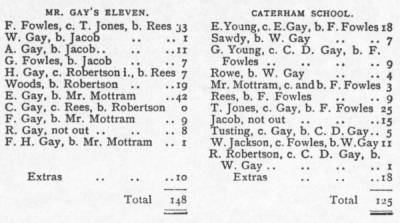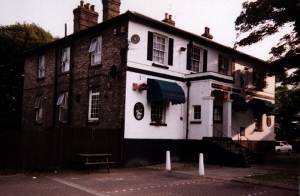
On a June day in 1913, Caterham School lost at cricket to the visiting "Mr. Gay's XI". Six of the winning team were brothers; Will, Ernest, Frank, Bert, Cecil and Fred were all the sons of William John and Emily Gay of Eastbrook End Farm in Dagenham, Essex. Perhaps their four sisters - Emily, Grace, Ethel and Constance - watched the game. It is certain that few, if any, of those present could have imagined that in little more than a year Britain would be plunged into war on an unprecedented scale; a war in which two of the brothers would win awards for gallantry but a third would lose his life.
William John's father had started farming in Essex after moving from Malmesbury in Wiltshire sometime during the 1850s. The family is known to have farmed Corbets Tey in Upminster during the late nineteenth century, though it is not clear that this was their first home in Essex. A case of tuberculosis in the family seems to have been the reason for William John and a younger brother being sent on a voyage to Australia and New Zealand. The excitement of such an adventure must have been ample compensation for the hard conditions on-board ship, and the brothers returned to England full of health. In his late twenties, William John - by then farming vegetables in the Barking area - married Emily Hollington, and shortly afterwards moved to Eastbrook End Farm. The family home was a square Victorian house, built on the site of Dagenham Old Hall, and separated by some 100 yards from the farm buildings. The couple raised a family of 10 children, of whom Cecil - born on 22nd November 1894 - was the ninth. The birth of Fred more than three years later completed the family, the size of which necessitated the building of an extension to the house in around 1902. The family spent most evenings in the large dining room created out of the extension, the drawing room being reserved for special occasions. The kitchen was a favourite haunt of the children, Cecil remembering it as being a hive of activity, where vast quantities of jams and pickles were made as well as the family's meals. Saturday mornings were devoted to baking cakes and the younger children would gather by the kitchen door at 11 o'clock when their sister Emily would let them have any burnt rock cakes and the trimmings off the sponge cakes. Emily ran the kitchen, while two resident maids were employed on house work, washing-up and laying the table.
The entrance to the house was up a short flight of steps. Cellars beneath the ground floor had small windows to let in daylight and gave the brothers space to indulge their hobbies. One cellar was turned into a photographic dark room; another was large enough to take a half-size billiard table. Egg collecting seems to have been an early hobby for the children though Cecil was keen to emphasise that they took only two eggs from a clutch so as not to harm the bird population. It was a hobby that led to a lifelong interest in birds. Cecil would surely have been pleased to know that a century later Eastbrook End would be just a short walk away from a nature reserve where a mix of wetland, grassland and scrub harbours a range of wildlife not normally found in an urban area1. The brothers were all educated at Caterham School in Surrey where they competed keenly at both studies and sport. Conditions at the school were spartan by today's standards with each day starting with a wash in cold water, hot water being reserved for a weekly bath. Growing on the slopes around the school were wild strawberries which the boys would pick to mix with sugar to make what Cecil referred to as "an appetising addition to our frugal food". As well as cricket, soccer and hockey were played at the school; Cecil was vice-captain of Hockey in 1911 & 1912 and vice-captain of Cricket in 1912, perhaps with little success as he remembered the standard of sport at the school as being "not very high". Each August the family, with the two maids in tow, left Eastbrook End for a month-long holiday in the West Country. The family was accustomed to renting a home until a particularly enjoyable stay in Salcombe in 1908 or 1909 prompted them to buy a property there. The following spring, William John purchased "Rockside", a waterfront house that would give the family much pleasure over the next 30 years. Cecil's enthusiasm for engineering, a subject which eventually would form the basis for a highly successful career, was probably sparked by his father's purchase of one of the first motor cars, a second-hand Auto Continental. The car was most unreliable and it was left to Ernest - Cecil's elder by 11 years - to make the necessary repairs to keep the car on the road. The Auto Continental was replaced by a new Spiker followed in 1913 by a Singer - in which most of the family learned to drive - and a Daimler which Ernest and Cecil collected in person from the Coventry works. In 1914 the family were by-and-large still together at Eastbrook End. Will and Ernest had joined their father on the farm after leaving Caterham. Frank had trained as a surveyor and was still living at home, as was Bert who by then was articled to a firm of chartered accountants. Cecil had gone up to Trinity College, Cambridge in the autumn of 1913 to read Mechanical Sciences but was at home during vacations. Fred was still at Caterham at the outbreak of war. Of the sisters, Emily was helping her mother at home, Grace and Constance were teaching, and Ethel was attending a ladies gardening school. Throughout that final glorious summer the whole family enjoyed tennis parties with friends and relatives at weekends, while Bert and Cecil had also taken up golf. The war would surely not last long. Cecil himself imagined that it would be resolved by a naval battle in which the Royal Navy would destroy the German Fleet.
|

